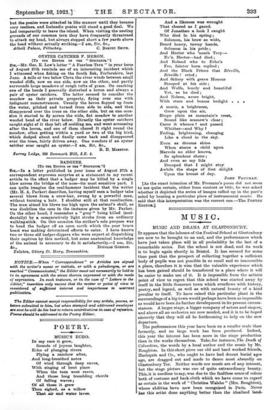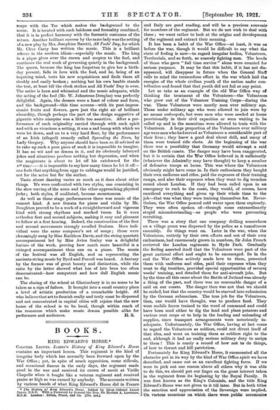MUSIC.
MUSIC AND DRAMA AT GLASTONBURY.
IT appears that the labours of the Festival School at Glastonbury are now to be brought to an end, and the performances which
have just taken place will in all probability be the last of a remarkable series. But the school is not dead, and its work is to begin again shortly in Bristol. It has seemed for some
time past that the prospect of collecting together a sufficient body of pupils was not possible ha so small and so inaccessible a place, therefore it is wise that the valuable experience which has been gained should be transferred to a place where it will be easier to make use of it. It is impossible from the artistic point of view to regret that this school was started away by itself in the little Somerset town which overflows with history, poetry, and legend, as well as with natural beauty of a kind peculiar to itself. To have raised this particular plant in the surroundings of a big town would perhaps have been as impossible as would have been its further development in its present circum- stances. A larger stage, a bigger company of actors and singers, and above all an orchestra are now needed, and it is to be hoped sincerely that they will all be forthcoming to help on the new departure.
The performances this year have been on a smaller scale than formerly, and no large work has been produced. Indeed, this year the interest has been more in the stage production than in the works themselves. Take, for instance, The Death of Columbine, the words by a local author and the music by Mr. Boughton. In this short piece our old and hard worked friends, Harlequin and Co., who ought to have had decent burial ages ago, are dragged out and made to dance most absurdly on Glastonbury Tor. Neither words nor music are of any interest, but the stage picture was one of quite extraordinary beauty. This, it is needless to say, was due to the faultless sense of colour both of costume and back-cloth which we have come to regard as certain in the work of " Christina Walshe " (Mrs. Boughton), whose abilities have now been recognized in Paris. Never has this artist done anything better than the idealized land- Dove with the Tor which makes the background to the scene. It is treated with such boldness and formality combined, that it is in perfect harmony with the fantastic costumes of the actors. Another brilliant success by the same lady was the setting of a new play by Mrs. Josephine Baretti, AU Fools' Day, for which Mr. Clive Carey has written the music. This is a brilliant scherzo in the modern idiom—especially the music. The king In a pique gives over the crown and sceptre to the fool, and continues the real work of governing quietly in the background. The queen, because the king has forgotten to give her a birth- day present, falls in love with the fool, and he, being of an inquiring mind, tests his new acquisitions and finds them all shoddy and easily broken ; nothing but his own bauble stands the test, at least till the clock strikes and All Fools' Day is over. The satire is keen and whimsical and the music adequate, while the acting of the fool (Mr. W. Johnstone-Douglas) was perfectly delightful. Again, the dresses were a feast of colour and form, and the background—this time screens—with its post-impres- sionist fruits and flowers, gave just the right air of brilliant absurdity, though perhaps the part of the design suggestive of gigantic white ninepins was a little too assertive. After a per- formance of such originality carried through with such spirit and with so vivacious a setting, it was a sad bump with which we were let down, and on to a very hard floor, by the performance of an Irish (alleged) comedy called Spreading the News, by Lady Gregory. 'Why anyone should have been so ill-advised as to rake up such a poor piece of work it is impossible to imagine. It has no wit and no drama in it, and its obviously laboured jokes and situations produce nothing but depression, and when the magistrate is about to let off his catchword for the nth timo-it is impossible to say how many times he let it off— one feels that anything from eggs to cabbages would be justified, not for the actor but for the author.
Taste about daneing varies as much as it does about other things. We were confronted with two styles, one consisting in the slow waving of the arms and the other approaching physical jerks ; both styles, if undiluted, become monotonous.
As well as these stage performances there was music of the concert kind. A new Sonata for piano and violin by Mr. Boughton proved to be a work of a straightforward and vigorous kind with strong rhythms and marked tunes. In it were orthodox first and second, subjects, making it easy and pleasant to follow at a first hearing. Indeed, the construction of the first and second movements strongly recalled Brahms. More indi- vidual were the same composer's set of songs ; these were charmingly sung by Miss Kathleen Davis, and the string quartett accompaniment led by Miss Aviee Seeley was a delightful feature of the work, proving how much more beautiful is a stringed accompaniment than one on a piano. The musk( of the festival was all English, and as representing the ancients string music by Byrd and Purcell was heard. A fantasy by the former was of great beauty and distinction, while the suite by the latter showed what has of late been too often demonstrated—how competent and how dull English music can be.
The closing of the school at Glastonbury is in no sense to be taken as a sign of failure. It brought into a small country place a level of artistic production of a remarkable height. All who believe that art.to flourish really and truly must be dispersed and not concentrated in capital cities will rejoice that the new home of the school is to be local, though within reach of the resources which make music drama possible alike for



































 Previous page
Previous page